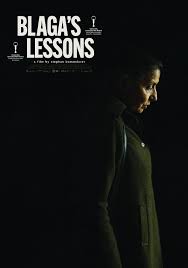
BLAGA’S LESSONS
Bulgaria, 2023, 114 minutes, Colour.
Eli Skorcheva, Rozalia Abgarian.
Directed by Stephan Komandarev.
This is a striking Bulgarian film, many audiences able to identify with the central character, but a series of events which lead to moral challenges and a very disturbing ending.
The setting is the Bulgarian city of caption demand, vistas of the city, the lives of ordinary people, homes and apartments, the streets, police precincts. But there are some striking episodes in the vast monument of the city, with its 1300 steps, commanding platform overlooking the city.
Blaga is played by veteran Bulgarian actress, Eli Skorcheva (her first film since the early 1990s). Recently widowed, her main commitment is to arrange a grave and effective headstones for her and her husband. We see her getting the runaround from the manager of the funeral company, changes of promises, down payments, crises, rival bidders for the grave…
In fact, this introduces us to one of the main themes of the film, a preoccupation with money.
Then there is the frightening episode where Blaga receives a phone call, allegedly from the police, warning her of robberies, an alternate phone calls of threats, for her to throw her money out the window into the street. She does, retreats, realises what she has done, goes to the police. They tell her tales of international fraudsters who use local “mules” to collect and deliver the money.
The experience is humiliating for Blaga, alters her dealings with the funeral director, makes her the target of abuse from her son who lives and works in the United States, journalists mocking her in disbelief and using the word dementia. She cannot get a job because she is 70.
There are some brighter moments when Blaga is coaching a young foreign woman for her language exam to get citizenship. But, dramatically, there are some dire consequences.
Blaga then gets a job, collecting and delivering money, phone calls, threats, her becoming a mule herself, but getting the money for the desired grave and headstones.
There is a sudden dramatic, alarmingly melodramatic, episode towards the end and a challenge to Blaga and her moral decisions. And the challenge to audiences as to what they would do in similar circumstances.
- A perspective on life in Bulgaria?
- The city settings, Shuman, homes and interiors, police precincts, the streets, shops, the surrounding countryside, dark settings for deliveries? The musical score?
- The impact of the film for older audiences? Identifying with Blaga? Her issues, the difficulties? The impact for younger audiences? Understanding age, pressures? Sympathy or not?
- The situation, Blaga, teaching language, precise and use of language, corrections, the loan man and her not encourage him at school? Her husband, police, many years? His death? Her religious beliefs, the funeral before 40 days and his leaving Earth? Money issues, the discussions with the manager of the funerals and monuments?
- The drama of the phone call, her susceptibility, the police, the warnings, the threats, the money, her confusion, the other phone, the abusive caller, the demands, collecting the money, throwing it over the balcony, going into the house? The decision to go to the police, no money, their explanation of the scams, Romanian criminals, local mules?
- Her living alone, the scenes at home, quiet? The girl coming for the lessons, language issues, comprehension issues, Blaga encouraging her, yet correcting her?
- Her predicament, the police asking her to go to the seminar, reactions, her being the victim? The intrusive journalist, the challenges to her mind, the later article and her dismay? Her son seeing the article? Her phone calls with him, his being abusive her, her turning him off?
- The issue of the gravestone, the details, the demands, the rivals, competitiveness, deposits, more money, change of price, her bargaining with him? His schemes and scams?
- Application for the jobs, too old? The student, putting the ad on the Internet, the phone call, the demands? Deliveries? Her really being aware of what was happening or not?
- The phone calls, the voice on the phone, aggressive, her going to the rendezvous, picking up the money, counting it, her cut, the delivery, the dark, the tire? The second situation, the money for the train from the window, the boy seeing her, his later talking to the police, his visit to the police and her hiding her face? Her realisation of what was happening? Her taking on the next case, the man coming after her, the fight, breaking the window of the car? Her not answering the phone, going quietly, thinking, throwing the phone away, keeping the money?
- The big monument and the steps? Her going up? Testing the student about it? Her repeating the clmb?
- The visits to the police, the reports of an old woman around the time of the money collection?
- The student, her success, the cake and the gift, wanting to bring her mother to Bulgaria? The thugs arriving, mistaking her identity, brutalising her, demanding the money?
- Blaga, at the store, her friend, the discussion about jobs, her return, hearing the noise, her moral decision, pause, abandoning the victimised woman, walking away?
- The bitterness of the ending? The culture of Bulgaria, the importance of money, scams and exploitation, the aged? And the challenge to the audience of what they would do in similar situations?